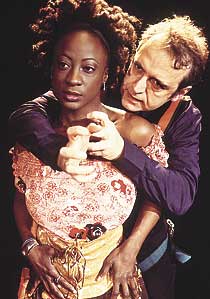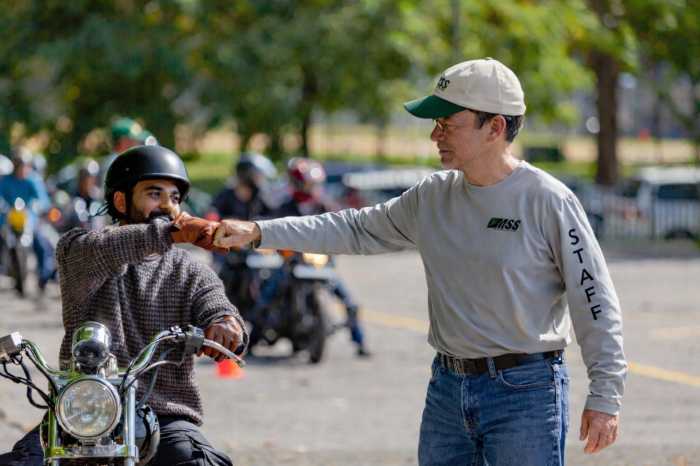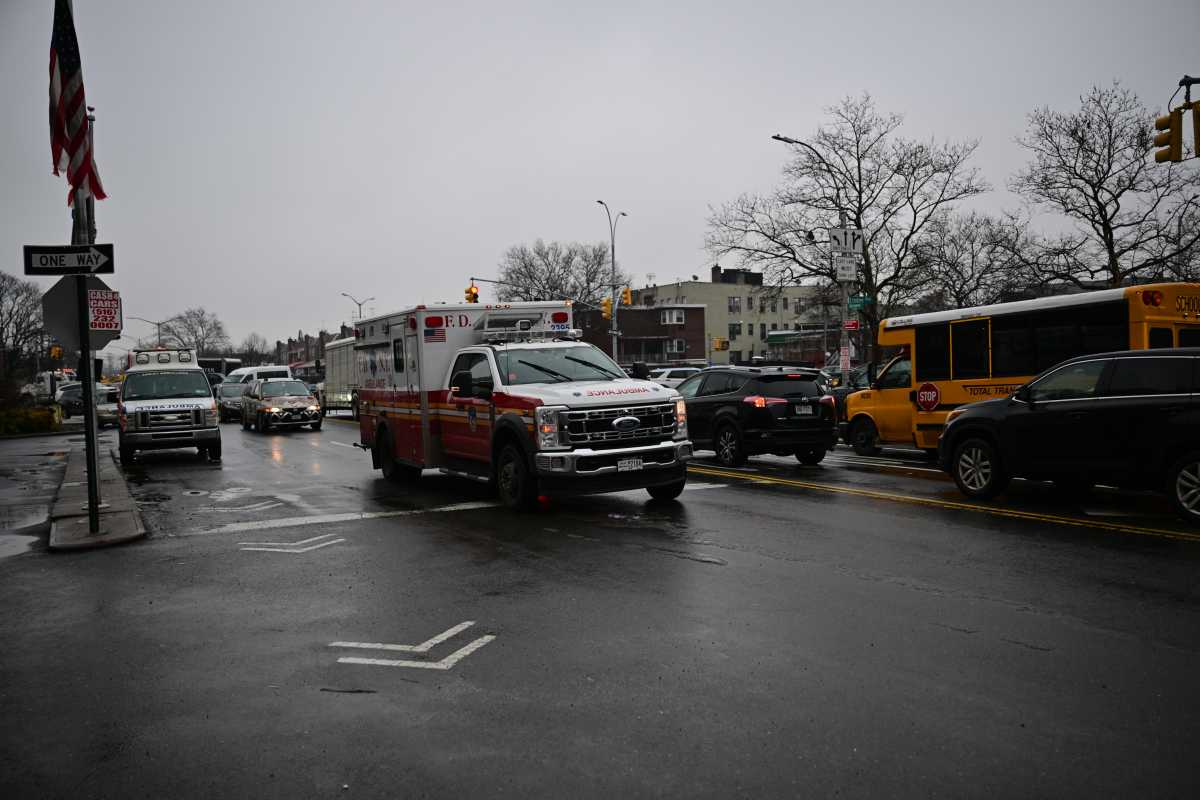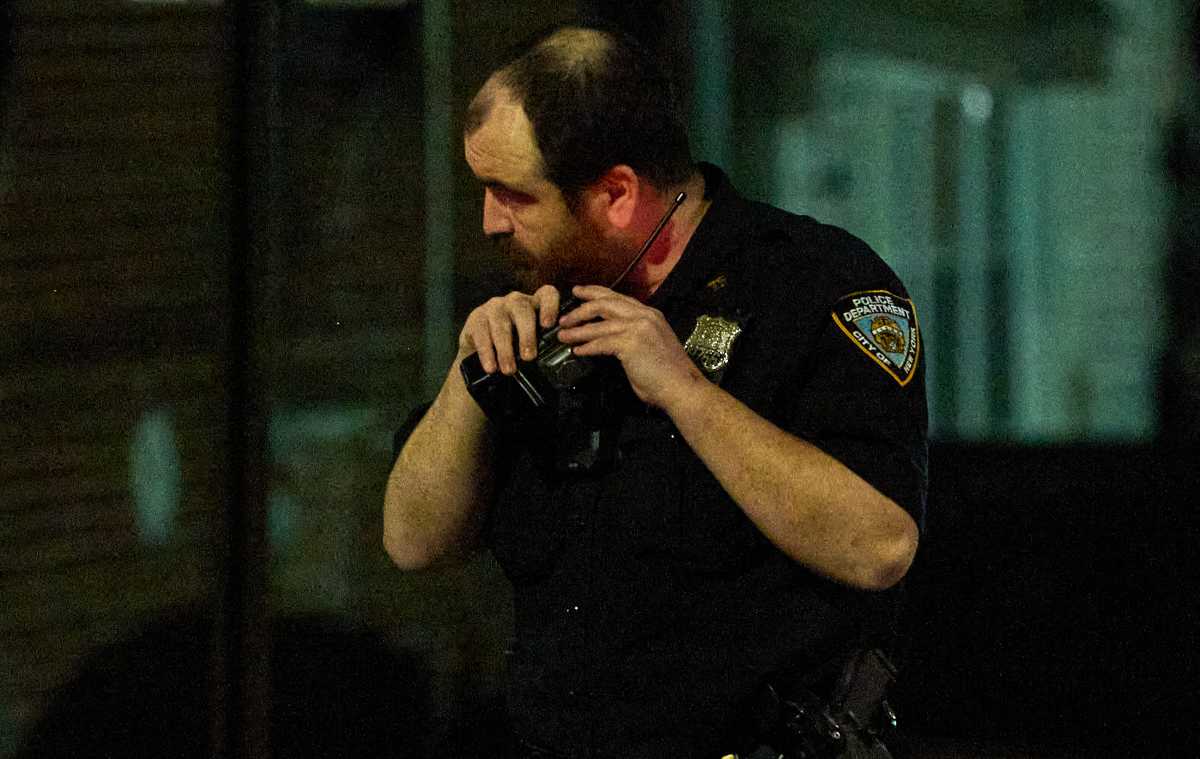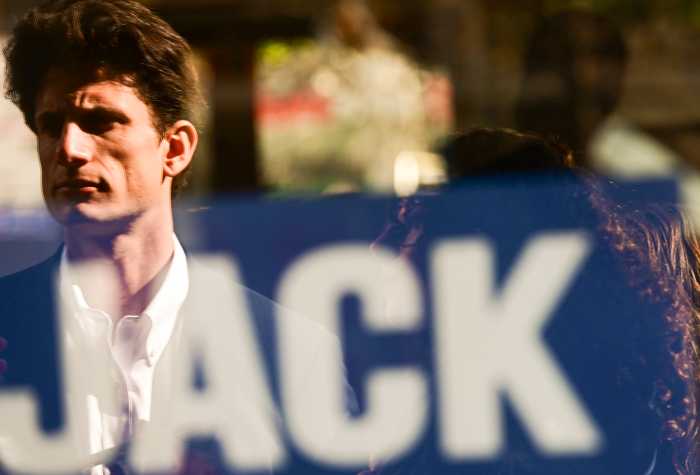The former Puritan Iron Foundry, an old,
deserted factory at 56 Water St. in DUMBO was recently converted
into theater space, with carpeted bleachers for seats and a broken
concrete floor for a stage. Blankets and space heaters supply
warmth, and the audience literally walks across the stage to
get to their seats.
Stepping into the theater to see Here Art Center’s production
of its site-specific dance-theater work, "Dead Tech,"
this reviewer couldn’t figure out why the theater was designed
in such an awkward, uncomfortable way. Then I realized the seating
was constructed to keep people awake and the placement of the
exit was planned to keep them from escaping.
"Dead Tech" is a radical reworking of Henrik Ibsen’s
"The Master Builder" by Here executive director Kristin
Marting and Celise Kalke, resident dramaturg for Chicago’s Court
Theatre.
The original play, written in 1892, deals with the struggles
and anguish of Master Builder Solness, a man who is afraid of
being supplanted by younger architects, just as he had supplanted
the generation of architects that came before him. As a symbolic
act, and through the urging of the young Hilda, he attempts to
climb to the top of a tower he has built on his new house, despite
his fear of heights. Solness makes it to the top, but falls and
is killed.
Under the influence of an architectural book called "Dead
Tech: A Guide to the Archeology of Tomorrow," by Manfred
Hamm, Rolf Steinberg and Robert Jungk, Marting and Kalke have
integrated architectural and technological texts into the play
and cut the Ibsen text in half. Books cited as instrumental in
the creation of "Dead Tech" also include "How
Buildings Learn" by Stewart Brand; "Body, Memory and
Architecture" by Kent C. Bloomer and Charles W. Moore; and
"Home" by Witold Rybczynski.
"These writings contributed to our analysis of home as domestic
architecture, tower as institutional architecture and castles
in the air as paper architecture," explained Marting. "We
also explored theories about how architecture is a reflection
of self and how self then extends into the immediate urban and
global communities. This expanded into the transitory nature
of all ideas, and how quickly they become outmoded."
If you think that’s pretty heavy stuff, wait, there’s more. Marting,
who directs the play, uses the gesture-based performance style
she has been developing for the past 10 years, inspired by the
work of French theater theorist Francois Del Sarte, whose stylized
approach to acting was the basis for the development of melodrama
as an acting style, and Eastern performance traditions like ancient
Indian Kathakali dance and Japanese kabuki plays, which communicate
complex ideas through a culturally specific body language. In
this hybrid directorial-choreographic form, gestures represent
archetypal emotions that signify outward emotion, inner conflict
or a personality trait. Much of this gesture-choreography is
accompanied by original music (lacking rhythm, theme and melody)
by Todd Griffin.
Daphne Gaines and Richard Toth as Hilda and Solness head a cast
that one suspects is quite talented. But Marting gives them little
chance of displaying that talent through any real acting. Instead
they prance and pose, announce and pronounce.
If you haven’t yet gotten the point, Marting et. al. once again
drive it home with projections of abstract architecture, a rather
large dollhouse that makes a perfect seat for actors to rest
on when they’re not performing but does little else, and loads
of reminders that we’re in a crude, industrial space – ropes,
ladders and bell-shaped bales of something suspended above the
stage.
For some people whose hearts start pounding at such words as
"experimental," "innovative" and "avant-garde,"
all this will doubtless sound compelling.
But there are others who prefer Ibsen’s original psychological,
social and symbolic drama with real people who live, love, laugh
and cry in something resembling human fashion. For them, "Dead
Tech" will appear to be a soulless, over-intellectualized
presentation with pedantic caricatures of people no one really
cares about. For these people, I have one suggestion: get "The
Master Builder" out of the library and stay home.
Here Art Center’s "Dead Tech"
plays through Feb. 23, Wednesday through Sunday at 8 pm at 56
Water St. at Main Street. Tickets are $15 on Sundays, Wednesdays
and Thursdays and $18 on Fridays and Saturdays. For reservations,
call (212) 647-0202. For more information visit www.here.org
on the Web.


